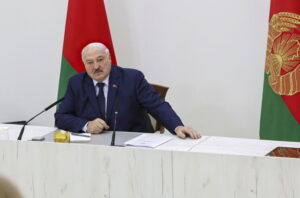Aleksandr Lukashenko has been elected to a seventh five-year term as president of Belarus, extending his already 31-year rule, after election officials officially declared him the winner of the presidential election held yesterday, Sunday, which Western governments have called a “fraud.”
“You can congratulate the Republic of Belarus, we have elected a president,” Igor Karpenko, head of the Central Election Commission, said during a press conference early this morning.
Lukashenko, a close ally of Russian President Vladimir Putin, had no real opponents in the election and garnered 86.8 percent of the vote, according to preliminary results posted on the Central Election Commission’s official account.
European politicians have complained that the election was neither free nor fair because independent media are banned in Belarus, and all top opposition figures have been jailed or forced to flee abroad.
“The people of Belarus had no choice. It is a bitter day for those who long for freedom and democracy,” German Foreign Minister Annalena Berbok commented to X.
The electoral commission said the turnout was 85.7 percent and 6.9 million citizens were eligible to vote.
When asked about the imprisonment of his opponents, Lukashenko said yesterday, Sunday, during a press conference that they chose their fate.
“Some chose prison, some chose ‘exile’, as you say. I did not kick anyone out of the country,” he said during this press conference that lasted more than four hours.
Earlier, the Belarusian president had defended his decision to jail dissidents and stressed that “I don’t give a damn about the West.”
Exiled opposition leader Svetlana Tikhanovskaia said this week that Lukashenko had organised his re-election as part of “a ritual for dictators”.
Protests were held yesterday, Sunday, against Lukashenko in Warsaw and other eastern European cities.
The Belarusian president himself rejects the criticisms, calling them insignificant, and says he is not interested in whether the West will recognize the result of the presidential election.
The EU and the US have announced they do not consider him a legitimate leader of Belarus after he used security forces to violently suppress protests that erupted after his previous election in 2020 when Western governments backed Tikhanovskaya’s claims that Lukashenko engaged in fraud and deprived her of victory.
Human rights advocacy group Viasna, which has been outlawed in Belarus as a perceived “extremist” organisation, pointed out that some 1,250 political prisoners remain in the country’s jails, despite Lukashenko pardoning more than 250 last year on humanitarian grounds, it explained.
In addition, U.S. Secretary of State Marco Rubio said yesterday that Belarus “just unilaterally released an innocent American woman,” whom he named as Anastasia Nufer, but gave no other details.
President Putin congratulates Lukashenko on his re-election and his “political prestige” Russian President Vladimir Putin today congratulated his Belarusian counterpart Aleksandr Lukashenko, who was re-elected as expected yesterday for a seventh term, hailing his “political prestige”, according to the Kremlin.
“Your decisive victory in the elections demonstrates your great political authority as well as the undeniable support of the population for the course Belarus is following,” Putin’s message, posted on the Kremlin’s website, said.
Aleksandr Lukashenko was elected to a seventh five-year term as Belarus’ president, extending his already 31-year rule, after election officials officially declared him the winner of a presidential election held yesterday, Sunday, which Western governments have called a “fraud.”
Lukashenko, a close ally of Russian President Vladimir Putin, had no real opponents in the election and garnered 86.8 percent of the vote, according to preliminary results posted on the official account of the Central Election Commission.
European politicians have complained that the election was neither free nor fair because independent media are banned in Belarus, and all top opposition figures have been jailed or forced to flee abroad.
Ask me anything
Explore related questions





